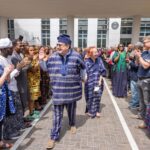By Salisu Sani-Idris
Vice President Kashim Shettima has identified agricultural revolution as a panacea to insecurity and poverty in the country.
Shettima stated this while delivering the 13th convocation lecture of the Al-Hikmah University in Ilorin, Kwara.
The News Agency of Nigeria (NAN) reports that the title of the lecture was: “Addressing Nigeria’s Food Security Challenge Through Hi-Tech Approach: The Role of Nigerian Universities”.
He said that a revolution could be achieved through the deployment of technology to actualise food security for the country’s growing population.
Shettima underscored the role of education and training of the country’s population to take full advantage of the growing influence of technology in all aspects of human existence.
“It is only when Nigeria begins to think boldly about revolutionising production, processing and guaranteeing sustained food security, that it can identify sectors of the nation’s agricultural assets that are most likely to benefit from the application of technology.

“Nigeria’s future can be secured by agricultural revolution through imaginative and bold leadership, a secure and peaceful environment, and a sound education system that does not reduce the limit of the citizens to only the sky.
“The final issue involves the choices Nigerians have to make regarding our future. We can overcome insecurity if we can grow our economy to radically reduce our poverty levels. Only an agricultural revolution can guarantee this.”
He said Nigeria could reduce its dependence on the rest of the world when the country can employ all who seek employment.
“We can improve our levels of political cohesion when we reduce stresses around diminishing resources and rely more on what we all have in abundance.
“I have a very healthy vision of our future as a nation, even when I am advised that we have huge challenges.
“I see a country that can survive its current limitations. History is replete with countries that almost gave up, but are among the strongest today.
“I believe our future lies in an imaginative and bold leadership, a secure and peaceful environment, and an education system that teaches us that only the sky is not our limit.”
The vice president noted that Nigeria has no justification not to be among the 10 richest countries in the world.
Shettima emphasised the value of realistic stocktaking of the nation’s assets and liabilities.
“Going by the amount of arable land, water resources and size of our humanity, Nigeria has no reason not to be among the 10 richest countries today.
“That we are near the bottom is precisely why we sought to offer our services to do justice to all that God has bestowed us with.
“Nigeria today reminds us that it is not enough to have potential. Indeed, the potential to grow and the failure to utilize that potential is a virtual death sentence for any living thing.
“For nations, it breeds frustration and decay. For countries such as ours, it breeds unacceptable levels of poverty and avoidable conflicts as we see today.”
“The call to transform potential into assets is the motivation for President Bola Tinubu. That is what he wants to offer to the nation in this most trying moment.
“And, I can testify to his faith, that this is a task that can be accomplished.”
He maintained that Nigeria had enough of everything needed to feed its huge population, grow a vibrant agricultural industry and supply huge markets with agricultural produce from which technology would have extracted the greatest value.
“In 25 years, we will have a population of about 450 million people. Only about 100 million of that population will be actively involved in economic activities because the rest are either too old or too young.
“This 100 million will have to be prepared to be optimally productive, and only a visionary and sustained marriage between technology and raw assets can ensure that. We believe this can and must be done.”
In his welcome address, the Vice-Chancellor of the University, Prof. Noah Yusuf, noted that food insecurity had become a big problem in Nigeria.
According to him, most citizens are struggling with how to find food for their daily living.
He thanked the Kwara State Government for constructing the road leading to the university and granting the permission to name the road after the university.
In attendance were Gov. AbdulRahman AbdulRazaq of Kwara, his deputy, Kayode Alabi, Inspector-General of Police, Kayode Egbetokun and Special Adviser to the President on Political Matters (Office of the Vice President), Dr Hakeem Baba-Ahmed.
Others are the Pro-Chancellor and Chairman of the Governing Council, Al-Hikmah University, Sekinat Yusuf, the Founder of the University, AbdulRaheem Oladimeji, Senators representing Kwara at the National Assembly, among others. (NAN) www.nannews.ng
Edited by Ephraims Sheyin












